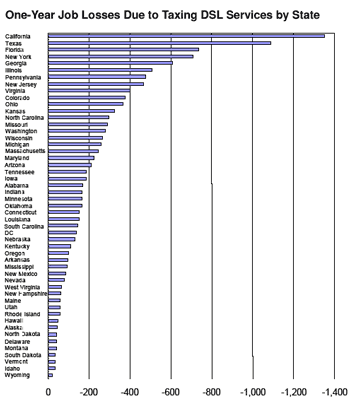This week, President Bush urged Congress to permanently ban the tax on broadband internet hookups. Steve Pociask at TeleNomic Research has just released an excellent paper that shows the impact of broadband taxes on consumers.
Pociask makes several important points that you should know:
- State and local taxes levied any portion of DSL services will be passed through to the consumer just like all the other telecommunications taxes-the proposed taxes are, in effect, a price increase to the consumer.
- Cable companies are exempt from telecommunications taxes. With proposed taxes in the 10% to 16% range on DSL services provides, cable internet providers will gain a significant pricing advantage.
- Consumers are very sensitive to price changes in their demand for internet services-they will migrate to the less expensive cable service or discontinue use of high-speed access. In both cases, the consumer will avoid paying the increased taxes.
- Loss of DSL customers means fewer revenues to the DSL service providers-they will need fewer employees and pay less of the taxes they currently pay, such as the Universal Service tax.
By quantifying the effects of taxation, Pociask has estimated the loss of jobs by state, pointing out that about three-quarters of these jobs come from union workers that will not be replaced by growth in other industries. The potential gain in the tax coffers is small relative to the widespread costs-and there are effects on lost productivity, investment, and economic growth that are still unclear. Read the complete study at: http://www.newmillenniumresearch.org/archive

|

